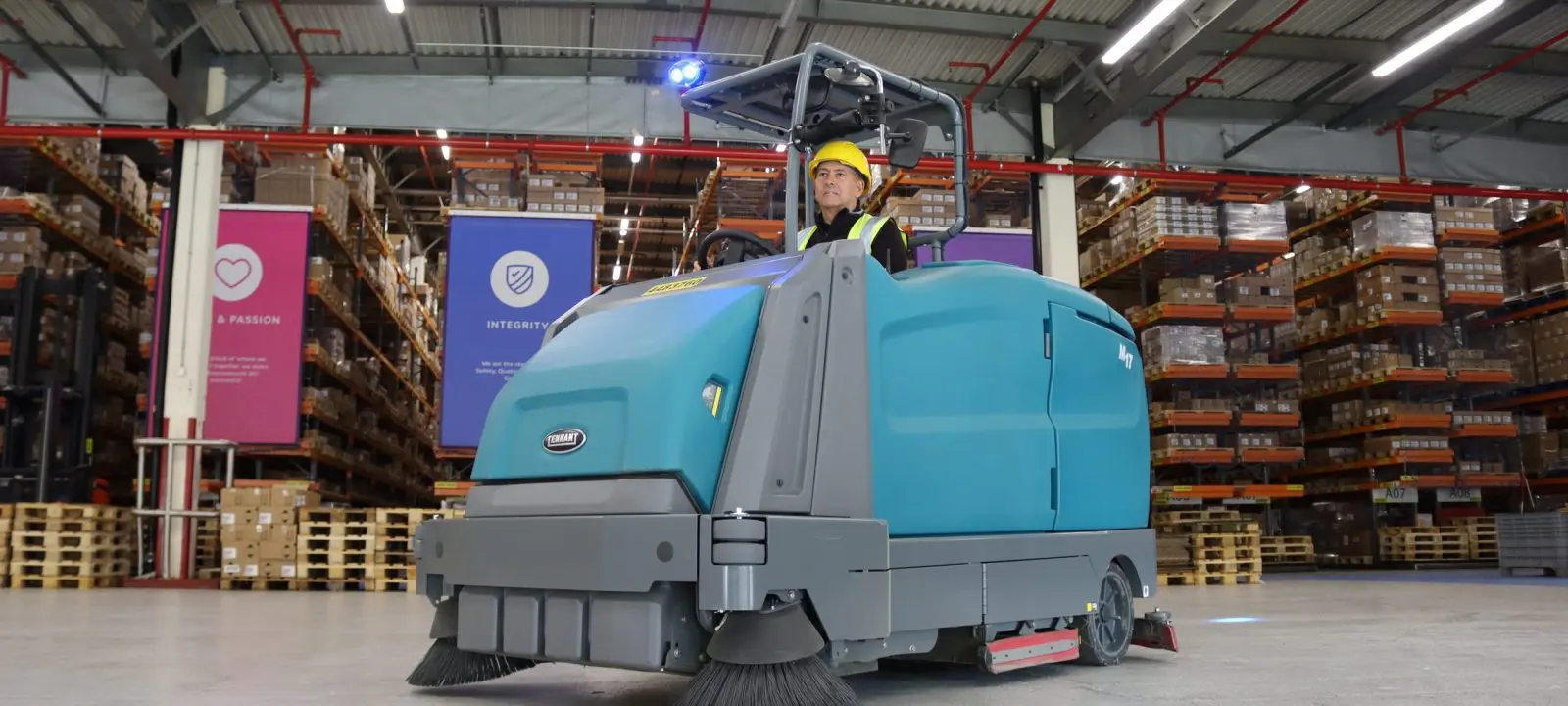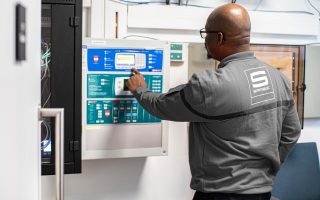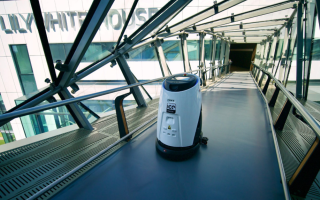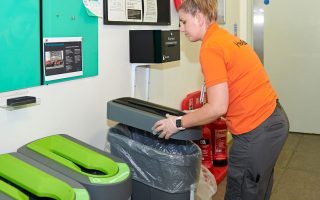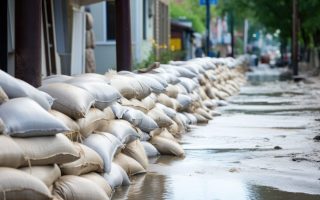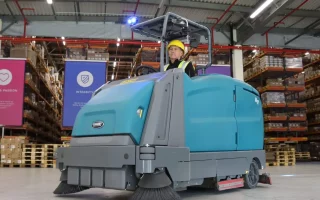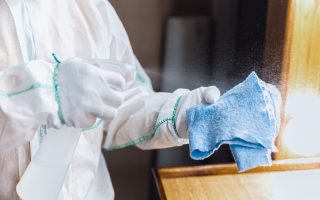Industrial flooring demands a robust approach to cleaning, given its exposure to grease spills, leaks, bacteria, and chemicals which can permanently stain or damage the flooring. Not only does maintaining the aesthetic of industrial areas matter for the morale of employees, but it is also crucial for safety. In 2022-23 alone, 135 workers lost their lives in work-related accidents and workplace regulations necessitate that industrial floors remain in good condition, given their susceptibility to frequent contamination, without compromising safety.
This guide explores effective methods and specific considerations for cleaning various types of industrial floors, including concrete and resin surfaces, and provides valuable insights on how to clean your industrial floors in what can be dangerous and busy operational areas.
The different methods of cleaning
There are two primary methods of cleaning industrial floors, including industrial resin floors, securing high standards of cleanliness without damaging the flooring itself:
- One-step method: This method involves scrubbing the floor and removing loosened dirt in a single pass, either using the same machine or process.
- Two-step method: The first step of this method involves covering the whole area with water and a cleaning agent, before sucking the solution up with a cleaning machine.
Some types of industrial flooring are more suited to the one-step method, and vice versa, and understanding your industrial flooring type is crucial in determining the most effective cleaning method.
Industrial floors made from screed
Screed flooring, made from a particular type of concrete, is used either as a base for a floor finish such as paint or can be used as a floor covering itself due to its smooth finish. Screed flooring is highly durable and as such is perfect for industrial floors, and there are different varieties of screed flooring, each with their own properties.
Magnesium screed (MA)
Magnesium screed is created by combining magnesium oxide (MgO) and magnesium chloride binders with fillers, such as sand or sawdust, with water. These components, when mixed and applied directly to a substrate or subfloor, undergo a curing process where, whilse they dry, they chemically react to become a highly durable surface.
Magnesium screed is durable and fire-resistant but sensitive to moisture. It benefits from the one-step method and requires regular vacuuming, sweeping, and damp mopping using pH-neutral cleaners. To learn how to clean your industrial floors effectively, it is recommended to avoid the use of excessive water, and any floor machinery should utilise soft brushes and pads.
Calcium sulphate screed (CA)
Calcium sulphate screed is most commonly used within the construction industry and is formulated by combining gypsum (calcium sulfate dihydrate), water, and additives. Additives may include polymers, accelerators, or retarders, and are used to modify the properties of the mix to create the desired specification.
Quick-drying, easily modifiable, and durable, calcium sulphate screed industrial floors benefit from a one-step cleaning method without excessive water usage.
Cement screed (CT)
The most common type of screed flooring, cement screed is created by combining Portland cement, sand, and water, with the Portland cement acting as a key binding agent.
Used for high-traffic industrial floors, cement screed is extremely strong and cost-effective, and suitable for use where there is heavy footfall or machinery use. Prone to acid damage, staining, and cracking, CT flooring requires periodic maintenance by regularly sealing the surface of the floor.
Along with prompt cleaning of spills using pH-neutral detergent, Samsic recommends avoiding excess water usage, floor sealing, and cleaning with the one-step method by sweeping, damp moping the floor to avoid damaging the flooring.
Mastic asphalt screed (AS)
Mastic asphalt screed flooring is made from a mixture of bitumen, limestone or sand aggregates, and filler materials. Bitumen, a sticky and viscous byproduct of crude oil, acts as the binder in the mixture and is heated to make it workable during the creation of the flooring.
Unlike other types of screed, mastic asphalt creed is water-resistant, dust-free, and predominately acid and alkali-resistant. Mastic asphalt screed for these benefits is used often as a base for industrial floors, with aesthetic covers used on the surface.
To learn how to clean your industrial floors made of mastic asphalt screed effectively, this material allows for easy cleaning using either one or two-step methods.
How do you do a deep clean for industrial floors?
A ‘deep clean’ for industrial floors goes beyond regular maintenance cleaning, with extra attention being applied to ensure the removal of stubborn stains, grime, and other contaminants that may have accumulated over time. Deep floor cleaning may also involve cleaning parts of the floor which are usually covered by equipment or storage containers, and as such may usually miss regular daily cleaning.
To deep clean industrial floors, including industrial resin floors, Samsic recommends applying the 2-step technique:
- Step 1: Cover the surface, clean it with a cleaning agent and scrub until the dirt loosens.
- Step 2: Remove the dirty water and then clean the area with the one-step method.
Following a deep clean on industrial floors it may be appropriate to reseal or recoat the floor, helping to keep the aesthetic of the area fresh whilst enabling more efficient cleans in the future.
How to remove light soiling
To clean light soiling from an industrial floor, scrubbing brushes and pads must be used with an appropriate cleaning solution as part of a systematic process to ensure effective and efficient results.
Our guide on how to clean your industrial floors is as follows:
- Preparing the floor:
Clear the floor of obstacles, machinery, and equipment to allow for unobstructed floor access. Tidy or move storage containers and display signage to alert others to the cleaning process.
- Sweeping or Vacuuming:
Use a broom or vacuum with a soft brush to remove loose dirt, dust, and debris, preventing abrasive particles from scratching the surface of the floor during scrubbing.
- Preparing the Cleaning Solution:
Dilute an appropriate floor cleaner or degreaser according to the manufacturer’s instructions, ensuring it suits the industrial flooring type. Ventilate when using heavy chemicals.
- Applying the Cleaning Solution:
Apply the solution evenly using a mop or sprayer, ensuring full coverage, especially in visibly soiled areas.
- Allowing Dwell Time:
Let the solution sit for the recommended time to break down and loosen soiling.
- Selecting Scrubbing Brushes or Pads:
It is important to choose the right scrubbing brushes or pads to avoid damage and ensure effective cleaning.
- Installing Brushes or Pads:
Attach selected brushes securely to the scrubbing machine, ensuring good condition to ensure the flooring does not become scratched and that any threats to health and safety can be avoided.
- Scrubbing the Floor:
Use the floor scrubbing machine to scrub the floor thoroughly, obeying safety guidelines, wearing proper PPE, and utilising signage. Adjust settings for flooring type, move in overlapping passes for full coverage.
- Pay Attention to Edges and Corners:
Use smaller brushes, pads, or hand tools to clean areas that the floor scrubbing machine may not reach effectively.
- Extraction or Vacuuming:
Utilise machine extraction, wet vacuum, or mop to remove the cleaning solution, soiling, and any excess water. Rinse if necessary.
- Allow the Floor to Dry:
Allow the floor to air dry or use fans, ensuring complete dryness before allowing foot traffic to resume.
- Inspection:
After drying, inspect the area to confirm effective removal of soiling. Address any remaining spots or areas if necessary.
The benefits of keeping your industrial floors clean
Maintaining cleanliness in industrial settings, knowing how to clean industrial floors, brings several advantages:
Safety Improvement:
Regular cleaning minimises slip and trip hazards, promoting a safer workplace, and reducing the risk of accidents. This fosters employee well-being and ensures legal compliance.
Enhanced Productivity:
A clean and organised environment boosts employee morale, leading to up to 15% higher productivity. It also extends machinery lifespan, reducing maintenance time and allowing more productive work hours.
Regulatory Compliance:
Clean floors uphold industry and environmental regulations, avoiding fines and legal issues linked to non-compliance.
Quality Assurance:
Prioritising cleanliness lowers the risk of contamination, ensuring high-quality products that meet quality control standards and customer expectations.
Easier Inspections and Audits:
A tidy environment facilitates easier identification of issues, streamlining inspections, and compliance processes, minimising risks.
Improved Image and Reputation:
Clean industrial flooring builds a positive image, showcasing commitment to quality, safety, and professionalism. It contributes to a positive reputation among employees, visitors to the site, suppliers, and stakeholders alike and can help to enhance business.
Cost Savings:
Clean floors reduce accident risks, associated costs, and the need for frequent equipment repairs, leading to overall cost savings.
A meticulously maintained facility, with expertise on how to clean industrial floors, not only promotes functionality, productivity, and well-being but also enhances brand image, potentially leading to increased business and financial gains.
Popular equipment used for cleaning industrial floors
Proper equipment is crucial for industrial floor cleaning, ensuring thoroughness, longevity, and a safe environment. Misuse may lead to damage and unnecessary repair costs.
Popular equipment for cleaning industrial floors, includes:
Floor Sweepers:
Ideal for minimising dust and debris in factories, these machines cover large areas quickly with high-capacity storage. Advanced dust control systems minimise airborne particles, preventing heavy amounts of dust being breathed in by employees or attaching to products. Floor sweepers offer, in comparison to other machinery, a lighter clean and are less likely to cause damage or premature wear to industrial floors, contributing to their longevity.
Floor Scrubber Dryers:
Efficient for deep cleaning, these machines combine scrubbing and drying, reducing manual labour, costs, and time spent on cleaning. Water-saving features promote sustainability by preventing excess water usage, and adjustable settings suit various floor types. Integrated drying ensures quick, safe floor usage after cleaning.
Steam Cleaners:
Suited for deep cleans, steam cleaners penetrate porous surfaces, dissolving dirt, grease, and stains without chemical agents. High-temperature steam disinfects, offering a cost-effective, chemical-free solution.
Pressure Washers:
Effective for outdoor and heavily soiled indoor areas, pressure washers remove dirt, grease, oil, and other stains quickly, making them highly effective for cleaning industrial floors. Minimising scrubbing reduces physical strain on cleaning staff, making them efficient for deep cleaning.
Efficient use of these popular industrial floor cleaning tools ensures optimal cleanliness, longevity, and safety in the workplace.
Industrial floor markers
Industrial floor markers, like tapes, paints, or stickers, designate areas, guide movement, and convey information on factory, warehouse, and industrial floors. These markers play a crucial role in ensuring safety, organisation, and efficiency within industrial settings, demarcating walkways, indicating hazardous zones, and providing clear instructions. Durability on high-traffic concrete industrial floors and industrial resin floors is vital, contributing to reduced maintenance costs, enhanced visibility, and increased safety and operational efficiency.
Line marking paint
Line marking paint, also known as striping, creates clear and durable lines on surfaces, including roads, parking lots, and industrial floors. Quick to apply and cost-effective, it adheres well, withstands traffic, and resists environmental factors. Whether applied with a brush or spray, line marking paint contributes to organised and safe environments indoors and outdoors.
Line marking tape
Line marking tape offers visibility for paths and storage, providing a versatile alternative to painted lines. Available in various colours, widths, and materials like vinyl or PVC, it ensures quick application, easy removal, and durability in heavy foot traffic and industrial environments.
Anti-slip floor tape
Designed to reduce slips and falls on floors and stairs, anti-slip floor tape has a textured surface for added traction. Durable, easy to install, and effective in preventing accidents, it is used in various settings including on industrial floors.
Industrial floor paint
Specialised industrial floor paint, suitable for concrete or industrial resin floors, is easy to clean and can be permanent or non-permanent. Withstanding heavy foot traffic, machinery, abrasion, and harsh conditions, it enhances safety, marks specific areas, and protects the underlying floor substrate. Key characteristics include durability, chemical and abrasion resistance, and a quick drying time, depending on the specific needs and conditions of the environment.
How to get the cleanest industrial floors possible with Samsic UK
At Samsic UK, a leading national Facilities Management provider, we prioritise cleanliness for enhanced safety and operational efficiency in industrial settings. Our innovative and eco-friendly solutions, including Samseal Floor Coating and Toucan cleaning, and our approach to providing service excellence, revolutionise industrial floor maintenance.
Our flagship floor coating, Samseal, provides a durable and aesthetically pleasing finish that is compatible with various floor types, including industrial resin floors. Samseal eliminates labour-intensive cleaning tasks such as buffing and polishing, and leaves flooring looking refreshed so there is no need to replace old flooring. Maintenance requires nothing more than tap water or our environmentally friendly Toucan cleaning solution. Additionally, Samseal exceeds British Standard slip resistance, ensuring anti-slip properties.
Another remarkable addition to our arsenal is the Toucan Active solution, our chemical-free combined disinfectant and cleaning agent. Toucan reduces daily chemical use and single-use plastic waste, promoting environmental responsibility. Created on-site and on-demand, it is highly cost-effective.
Our operations and the development of our innovations are driven by our Samsic 2030 sustainable development program. The program aims to minimise our environmental impact across our entire business chain, with a specific focus on carbon reduction. Our solutions support operational performance and environmental responsibility.
At Samsic, we invest in our teams through BICSc Cleaning Professional Skills Suite standards, ensuring the highest health, safety, training, and quality assurance standards. Our commitment to surpassing industry benchmarks is evident in the continuous development opportunities we offer our teams, including apprenticeships, further education, and qualifications. We provide our clients with skilled and dedicated teams to ensure service excellence.
Collaborating closely with clients, we offer bespoke and innovative solutions using state-of-the-art technology and sustainable detergents, consistently delivering high cleanliness standards. Our success with clients like Coty, Scott Bader, and Kraft Heinz reflects our effective approach in restoring industrial floors to a like-new quality.
Choose Samsic UK for a trusted, superior service in cleaning and maintaining industrial floors.

